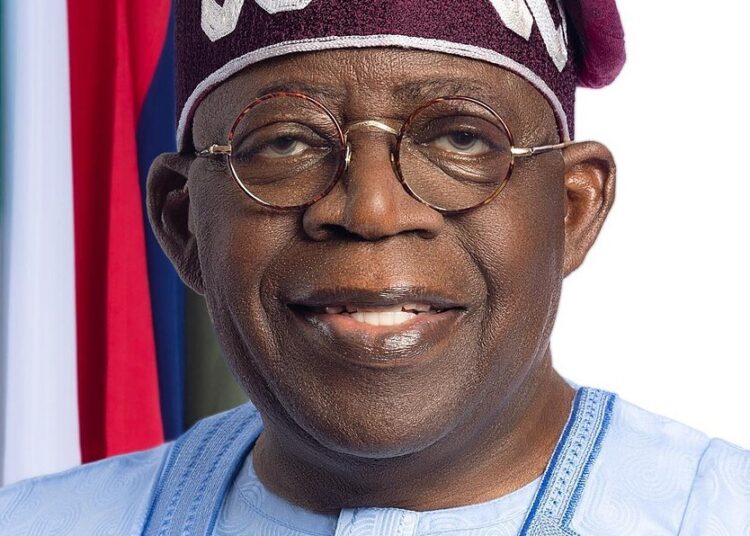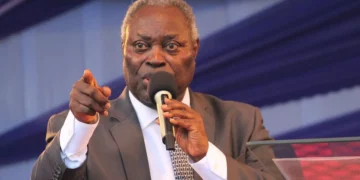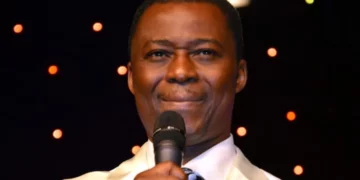Every so often, Nigerian politics gives us a phrase that escapes the room it was uttered in and wanders into the streets. We’ve had “body language” (thank you, Buhari), “go and die” (thanks, Oshiomhole), and “stomach infrastructure” (Ekiti will never forget).
Now, we may have a new entry: “wet the grass.”
It came last Thursday at the APC National Executive Committee (NEC) meeting, a typically stiff gathering of governors, party elders, and power brokers. Then, President Bola Tinubu — never one to miss a moment — leaned in and told his governors what every roadside pepper seller, bus conductor, and village elder has been muttering under their breath for months:
“Nigerians are still complaining at the grassroots. You must wet the grass more.”
There it was. Half metaphor, half memo, and one hundred percent vintage Tinubu.
Because here’s the thing: when a party has been in power for twelve years — long enough for its logo to peel off ward offices and for “change” to sound like yesterday’s promise — it risks something deadly in politics: disconnection. And Tinubu, a man who has built his career on understanding political currents, was reminding his party that dry grass burns fast.
The headline news from Thursday was the election of Professor Nentawe Yilwatda as the new APC National Chairman.
Who is he?
An academic. An engineer. A former INEC commissioner. A man who has spent more time around computer labs and whiteboards than smoky political backrooms. He doesn’t fit the usual caricature of a Nigerian party chairman — you know, the ones with bottomless agbadas, 17 honorary chieftaincy titles, and an instinct for political survival that would shame a cockroach.
Yilwatda is different. He’s more “PowerPoint” than power-broker. In his acceptance speech, he called APC a “vehicle” and himself and the governors the “mechanics.”
“We are all mechanics of this vehicle—the APC—and together, we will fix it and drive it to our destination,” he said.
It was a neat line. But let’s be real — the APC bus hasn’t just had a few flat tyres. It’s been overheating on Third Mainland Bridge, leaking oil in Sokoto, and coughing black smoke in Berger roundabout in Abuja .Yilwatda, the technocrat, has been handed the keys. The question is: can he drive?
If anyone thought Thursday’s NEC meeting would be all handshakes and photo ops, Tinubu made sure they thought again.
He praised the outgoing chairman, Abdullahi Ganduje (who left more murmurs than momentum), but wasted no time issuing marching orders.Build a new party secretariat in Abuja.Sweep across the states to register and welcome new members.
And, above all, wet the grass.
What does that even mean?
Tinubu wasn’t talking about sprinklers or irrigation systems. He was talking about reconnecting the APC to ordinary Nigerians. About governors remembering that their job isn’t just to smile in Abuja and tweet slogans — it’s to make things work on the ground.
He also reminded his party that doors must remain open:
“Our doors are still open, and we should wholeheartedly embrace those who join us,” he said, dismissing the opposition as a “coalition of confusion.”
Translation: if you’re an ambitious politician tired of your party’s drama, APC is here. Bring your followers, bring your grievances, bring your broom.
There was something unspoken hovering in that NEC hall. Something that wasn’t written in the communiqué but was whispered in corridors and hinted at in speeches: 2027.
It’s not a campaign season yet — at least, not officially. But in Nigeria, campaign season starts the day after you’re sworn in.
By electing Yilwatda now, APC isn’t just filling a vacancy. It’s setting the stage for the next big fight. The party has to prove that it can remain not just the ruling party but the dominant one.
Tinubu knows this. He’s seen how the PDP once strutted around claiming it would rule for 60 years, only to trip on its own arrogance. He’s not about to let APC make the same mistake.
That’s why Thursday’s NEC wasn’t just about Yilwatda. It was a stress test for APC’s future.Here’s a truth about Nigerian politics that’s both obvious and ignored: real politics happens at the grassroots.
It’s not in the NEC halls, or even on TV. It’s in ward meetings under mango trees. It’s in community halls with flickering bulbs. It’s in whispered deals with local influencers — the ones who may not have Twitter handles but have the power to swing 2,000 votes on election day.
Tinubu, who cut his teeth building the formidable Lagos APC machine, knows this better than anyone. That’s why his “wet the grass” line landed.
Because when the grassroots feel dry — neglected, ignored, starved of attention — they don’t just complain. They drift.
And if they drift too far, APC might find itself waking up in 2027 to the same rude shock PDP got in 2015.
So, what can APC expect from its new chairman?Professor Yilwatda’s CV is impressive: decades in academia, a stint as INEC Resident Electoral Commissioner, consultancy work with UNICEF and the World Bank, and a reputation for digital transformation.
He’s the kind of man who can tell you the latest advances in cassava bioengineering — but can he tell you how to pacify a local party chieftain whose cousin was denied a council seat?
Can a man who has spent 26 years in university corridors handle the mud and smoke of Nigerian party politics?
Because APC, for all its talk of “progressive doctrine,” is still a party of interests. Interests that have to be massaged, balanced, and sometimes wrestled.
Abdullahi Ganduje’s tenure as APC chairman was… let’s say, “eventful.” He inherited a party trying to move past the Buhari years and position itself for Tinubu’s era. But instead of defining the APC doctrine, Ganduje spent much of his time putting out internal fires and dodging his own shadows.
Tinubu’s message on Thursday was clear: that era is over.
He wants an APC that is not just a winning machine but a working one — a party with an actual ideological backbone, a “progressive institute,” even.
It’s ambitious. Nigerian parties are not famous for ideology. They’re famous for defections, dinners, and drama.
But if Tinubu can turn APC into something more than a vehicle for elections — if he can make it an institution that actually produces ideas, policies, and leaders — that would be legacy-level politics.
Tinubu also dropped another line that got less attention but matters just as much:
“It is not easy to navigate the stormy waters of economic instability. Now, the economy is stabilised—there is no fear for the country except for continued upward movement and sustained growth.”
He pointed to record FIRS collections — ₦14.9 trillion in the first half of the year, up 43% from last year.Numbers like that make headlines. But numbers don’t vote. People do.
And for most Nigerians, the question isn’t whether the FIRS is hitting record numbers. It’s whether they can afford rice next week.
That’s the real “grass” Tinubu was talking about. That’s the part Yilwatda, APC governors, and party big men must “wet” if they want to remain in charge come 2027.
Thursday’s NEC wasn’t all politics. The meeting paused to observe a minute’s silence for Muhammadu Buhari, for Aminu Dantata, and for the Awujale of Ijebuland.
It was a reminder that power is temporary, that the men and women who run Nigeria today will one day be mourned like those they honored.
Tinubu, a student of history, understands legacy. He’s thinking about his.And Yilwatda, the professor-turned-chairman, is now tasked with writing the next chapter of APC’s story.
For all the metaphors and motions, here’s the blunt truth:
If APC “wets the grass,” listens to ordinary Nigerians, and actually delivers — not just promises — it could dominate for another decade.
If it doesn’t, if it allows the grassroots to wither and dry, if it forgets that ward meetings and village squares are where power really lives, then it will find itself learning the same painful lesson PDP learned in 2015: Nigeria doesn’t do permanent ruling parties.
Professor Yilwatda’s election is a pivot point.Tinubu has handed him the keys to APC’s bus, but also a watering can — and a warning.
Wet the grass. Keep it green. Or watch it burn.Because in Nigerian politics, as in farming, nothing grows on dry ground.





